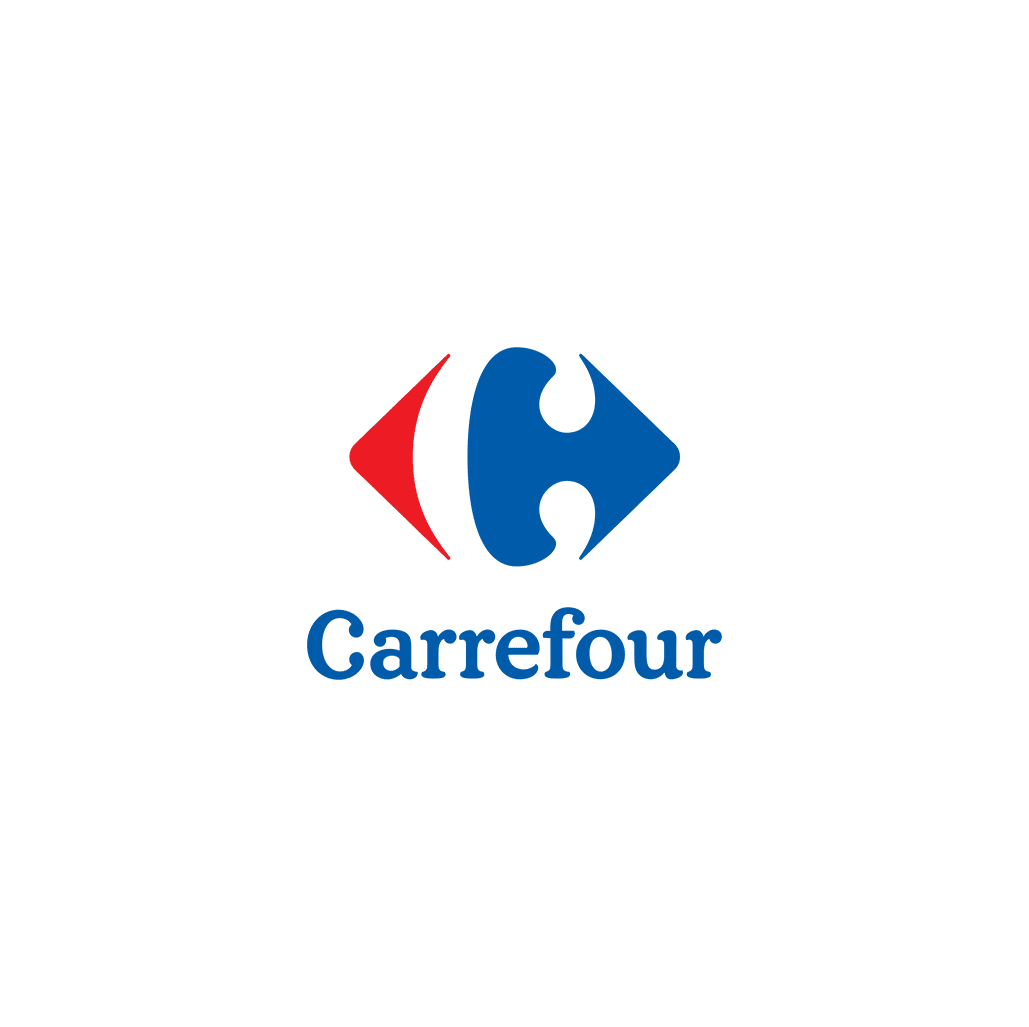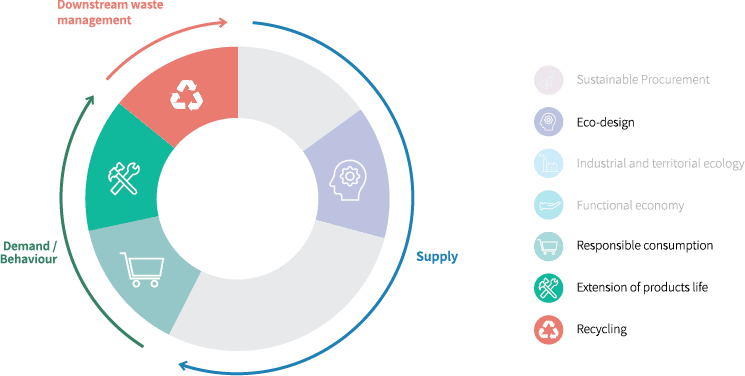Carrefour is committed to more environmentally friendly packaging solutions to reinvent packaging and move from disposable to a packaging and move from disposable to a circular economy; Carrefour will support and defend a National Pact for a 100% circular economy for packaging in France

Terms of the action or commitment
1) Lean packaging: Carrefour is committed to reducing its plastic packaging, particularly those that are difficult to recycle, and to developing
reuse solutions for customers.
2) All packaging is recyclable: the Group guarantees that 100% of Carrefour’s product packaging can be recycled or composting. Alternative materials will be chosen to gradually replace non-recyclable plastics. 3) Carrefour, relaying sorting instructions: the Group will deploy sorting assistance solutions for its customers, particularly in countries that do not have an efficient collection system. collection system.
4) Carrefour will recycle all packaging used in hypermarkets for transport, handling and delivery.
5) Carrefour is acting for a new resource economy: to make recycling a reality, Carrefour wants to accelerate its economic viability and
5) Carrefour is acting for a new resource economy: to make recycling a reality, Carrefour wants to accelerate its economic viability and is committed to choosing recycled materials whenever they are available and accessible. Its first action will be to incorporate 50% recycled plastics in its juice bottles, which will be recycled plastics in its juice, soda and mineral water bottles.
6) Oceans without plastic waste: To preserve marine biodiversity, the Group is committed to removing from the market certain plastic products most frequently found in the oceans. found in the oceans while participating in the recovery of plastics in natural areas
2) All packaging is recyclable: the Group guarantees that 100% of Carrefour’s product packaging can be recycled or composting. Alternative materials will be chosen to gradually replace non-recyclable plastics. 3) Carrefour, relaying sorting instructions: the Group will deploy sorting assistance solutions for its customers, particularly in countries that do not have an efficient collection system. collection system.
4) Carrefour will recycle all packaging used in hypermarkets for transport, handling and delivery.
5) Carrefour is acting for a new resource economy: to make recycling a reality, Carrefour wants to accelerate its economic viability and
5) Carrefour is acting for a new resource economy: to make recycling a reality, Carrefour wants to accelerate its economic viability and is committed to choosing recycled materials whenever they are available and accessible. Its first action will be to incorporate 50% recycled plastics in its juice bottles, which will be recycled plastics in its juice, soda and mineral water bottles.
6) Oceans without plastic waste: To preserve marine biodiversity, the Group is committed to removing from the market certain plastic products most frequently found in the oceans. found in the oceans while participating in the recovery of plastics in natural areas
Levers mobilized for circular economy (according to Ademe)

Implementation timeline
Starting year
2018
Ending year
2025
Main actors mobilized
Internal actors
CSR, Merchandise departements
External actors
Suppliers, retailers, Consumer Good Forum, Ellen mac Arthur Foundation
Geographic area
The 9 integrated countries of the Carrefour Group: France, Spain, Italy, Belgium, Poland, Romania, Brazil, Argentina and Taiwan
Photo / Video
Titre de la diapositive
Lorem ipsum dolor sit amet, consectetur adipiscing elit. Ut elit tellus, luctus nec ullamcorper mattis, pulvinar dapibus leo.
Cliquer ici
2022 follow-up of the action
Date of follow-up
December, 2021
Methods of validation of the follow-up
Internal verification of the implementation of action plans and third party audit of published indicators and policies implemented by the Group.
Status of the action
In progress
Completed
a) Results
Achieved
Partially achieved
Not achieved
b) Numerical / Qualitative information
Cancelled
Explanations
Comparison with the projected pace in the last publications
Keeping up with the times
In advance
Delayed
Partial / Final results
The Group’s objectives to meet its commitment are as follows:
A. Reduce the amount of packaging put on the market by 5% in 2022 compared to 2017;
B. Achieve 100% reusable, recyclable or compostable packaging by 2025 for Carrefour branded products;
C. Carrefour supports and defends national and European pacts for a 100% circular economy for packaging.
A. This target was reformulated in the strategic plan launched in 2018 and covering the period 2018-2022. The indicator monitored is the reduction in the quantity of packaging placed on the market in tonnes: -20,000 tonnes, including 15,000 tonnes of plastic packaging by the end of 2025 (vs. 2017). The target for this indicator has been re-evaluated at the end of 2021, from -15,000 to -20,000 tonnes.
By the end of 2021, 11,068 tonnes of packaging had been avoided, representing a 119% achievement rate of the target set for 2021, to reach the final target of 2025.
B. By the end of 2021, the target of 100% recyclable, reusable or compostable packaging is measured in France and stands at 46%.
C. Carrefour continues its commitment to national and European pacts.
A. Reduce the amount of packaging put on the market by 5% in 2022 compared to 2017;
B. Achieve 100% reusable, recyclable or compostable packaging by 2025 for Carrefour branded products;
C. Carrefour supports and defends national and European pacts for a 100% circular economy for packaging.
A. This target was reformulated in the strategic plan launched in 2018 and covering the period 2018-2022. The indicator monitored is the reduction in the quantity of packaging placed on the market in tonnes: -20,000 tonnes, including 15,000 tonnes of plastic packaging by the end of 2025 (vs. 2017). The target for this indicator has been re-evaluated at the end of 2021, from -15,000 to -20,000 tonnes.
By the end of 2021, 11,068 tonnes of packaging had been avoided, representing a 119% achievement rate of the target set for 2021, to reach the final target of 2025.
B. By the end of 2021, the target of 100% recyclable, reusable or compostable packaging is measured in France and stands at 46%.
C. Carrefour continues its commitment to national and European pacts.
Company's comments
Adopted in 2019, the 2019 European Directive (EU) 2019/904 promotes a circular economy, where materials are reusable and products are repairable rather than disposable.
The text sets a target of separate sorting of 77% of plastic bottles by 2025 and up to 90% by 2030. By the same date, bottles must be made from at least 30% recycled plastics.
a. Reduce the amount of packaging put on the market by 5% in 2022 compared to 2017:
Carrefour carried out a diagnosis of the irritants encountered by customers in their shops in France and Spain in 2019, from which it established various priorities. For organic fruit and vegetable departments, Carrefour replaced bioplastic bags with kraft paper bags in various hypermarkets in France from 2019. In addition, Carrefour has continued to replace packaging with recyclable materials: these changes have led to annual reductions of 32 tonnes for organic bananas (replacement by ribbons and labels). Carrefour has also saved 171 tonnes of plastic thanks to the reduction in the use of virgin plastic on washing-up liquid bottles by the end of 2021.
Bulk packaging is being deployed as a priority in all Carrefour formats and organic departments. 149 references are already available in this form in France by the end of 2021. In the bakery sections, plastic-free packaging is being tested. Carrefour is also working to reduce over-packaging linked to promotional batches and individual portions. Finally, packaging savings have been made in the electronics and stationery categories.
b. Achieve 100% reusable, recyclable or compostable packaging by 2025 for Carrefour-branded products:
Reuse of packaging: Reusable packaging solutions are deployed in shops in all formats: Carrefour was the first retailer to deploy the “Bring your own container” initiative in all European countries. The operation allows customers to use their own container to take away products purchased in traditional departments (fish, meat, delicatessen, etc.). In France, all bioplastic bags have disappeared from shop shelves to be replaced by kraft bags and reusable organic cotton bags. Carrefour is also developing e-commerce solutions to promote reusable packaging solutions. A short circular economy loop for all home delivery bags via Carrefour.fr has been set up: more than 600,000 bags per were recovered and reused in France in 2021. With TerraCycle, Carrefour launched Loop by Carrefour in 2019 making the Group one of the first French retailers to have introduced a deposit solution in partnership with Loop. Loop is a sustainable deposit and container system, which offers more than 43 product references by the end of 2021 and helps to reduce single-use packaging. The initiative has also been implemented in-store since October 2020; consumers can return the containers of returnable products in 7 local shops in Paris. In 2021, the initiative has been extended to the Montesson hypermarket (78) and 10 new convenience stores, bringing the number of shops offering the Loop deposit service to 20.
Recyclability of packaging: Carrefour is working with its customers to improve collection and sorting. Following promising results, two RVM (Reverse Vending Machine) terminals have been installed in the Chartres and Rambouillet shops in 2021. The Group also involves its suppliers in the approach with the Food Transition Pact network, which offers a platform for exchange, sharing of good practices and new opportunities for collaboration. Participating suppliers commit to an action plan that includes eliminating unnecessary consumer packaging, reducing the volume of packaging and clear labelling on recycling. In 2021, 114 suppliers are members of the pact, including 38 international suppliers representing 30% of the Group’s FMCG sales.
c: National and European pacts for plastic packaging:
The National Pact successfully launched in February 2019 hosts a coalition of retailers and manufacturers all having to meet the same individual commitments made explicit in the text of the Pact. Within this Pact, Carrefour is working with other companies to collectively rethink a more sober use of plastic and innovate for a circular economy. A consensus has emerged within the Pact that plastic never becomes waste.
Carrefour supports the creation of a pact in each of its integrated countries, and supports the European pact.
The text sets a target of separate sorting of 77% of plastic bottles by 2025 and up to 90% by 2030. By the same date, bottles must be made from at least 30% recycled plastics.
a. Reduce the amount of packaging put on the market by 5% in 2022 compared to 2017:
Carrefour carried out a diagnosis of the irritants encountered by customers in their shops in France and Spain in 2019, from which it established various priorities. For organic fruit and vegetable departments, Carrefour replaced bioplastic bags with kraft paper bags in various hypermarkets in France from 2019. In addition, Carrefour has continued to replace packaging with recyclable materials: these changes have led to annual reductions of 32 tonnes for organic bananas (replacement by ribbons and labels). Carrefour has also saved 171 tonnes of plastic thanks to the reduction in the use of virgin plastic on washing-up liquid bottles by the end of 2021.
Bulk packaging is being deployed as a priority in all Carrefour formats and organic departments. 149 references are already available in this form in France by the end of 2021. In the bakery sections, plastic-free packaging is being tested. Carrefour is also working to reduce over-packaging linked to promotional batches and individual portions. Finally, packaging savings have been made in the electronics and stationery categories.
b. Achieve 100% reusable, recyclable or compostable packaging by 2025 for Carrefour-branded products:
Reuse of packaging: Reusable packaging solutions are deployed in shops in all formats: Carrefour was the first retailer to deploy the “Bring your own container” initiative in all European countries. The operation allows customers to use their own container to take away products purchased in traditional departments (fish, meat, delicatessen, etc.). In France, all bioplastic bags have disappeared from shop shelves to be replaced by kraft bags and reusable organic cotton bags. Carrefour is also developing e-commerce solutions to promote reusable packaging solutions. A short circular economy loop for all home delivery bags via Carrefour.fr has been set up: more than 600,000 bags per were recovered and reused in France in 2021. With TerraCycle, Carrefour launched Loop by Carrefour in 2019 making the Group one of the first French retailers to have introduced a deposit solution in partnership with Loop. Loop is a sustainable deposit and container system, which offers more than 43 product references by the end of 2021 and helps to reduce single-use packaging. The initiative has also been implemented in-store since October 2020; consumers can return the containers of returnable products in 7 local shops in Paris. In 2021, the initiative has been extended to the Montesson hypermarket (78) and 10 new convenience stores, bringing the number of shops offering the Loop deposit service to 20.
Recyclability of packaging: Carrefour is working with its customers to improve collection and sorting. Following promising results, two RVM (Reverse Vending Machine) terminals have been installed in the Chartres and Rambouillet shops in 2021. The Group also involves its suppliers in the approach with the Food Transition Pact network, which offers a platform for exchange, sharing of good practices and new opportunities for collaboration. Participating suppliers commit to an action plan that includes eliminating unnecessary consumer packaging, reducing the volume of packaging and clear labelling on recycling. In 2021, 114 suppliers are members of the pact, including 38 international suppliers representing 30% of the Group’s FMCG sales.
c: National and European pacts for plastic packaging:
The National Pact successfully launched in February 2019 hosts a coalition of retailers and manufacturers all having to meet the same individual commitments made explicit in the text of the Pact. Within this Pact, Carrefour is working with other companies to collectively rethink a more sober use of plastic and innovate for a circular economy. A consensus has emerged within the Pact that plastic never becomes waste.
Carrefour supports the creation of a pact in each of its integrated countries, and supports the European pact.
